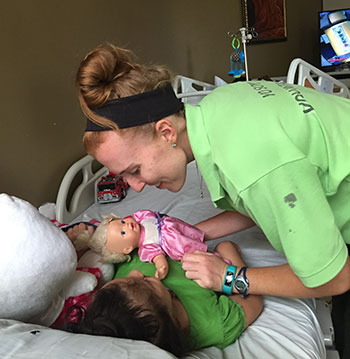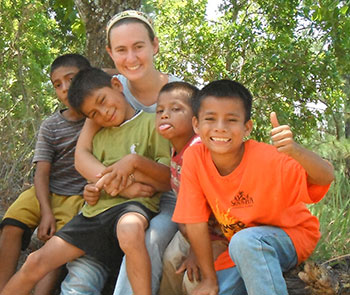
Johanna Cajina, B.A. 2015, left, spent a year at a home for at-risk girls in Costa Rica called Niño Con Cariño through FrancisCorps.
Alumni who embark on long-term service experiences have a chance to use their gifts, expand their perspectives, and clarify their life’s path.
 Through the organization FrancisCorps, Caroline Johnson, B.S.W. 2015, spent a year in Costa Rica working at Hogar Manos Abiertas (Open Hands Home), a nonprofit hospital that supports abandoned children with severe congenital birth defects. Johnson’s responsibilities included bathing, feeding, and dressing the kids. She often worked with them on simple academic skills.
Through the organization FrancisCorps, Caroline Johnson, B.S.W. 2015, spent a year in Costa Rica working at Hogar Manos Abiertas (Open Hands Home), a nonprofit hospital that supports abandoned children with severe congenital birth defects. Johnson’s responsibilities included bathing, feeding, and dressing the kids. She often worked with them on simple academic skills.
She loved all the children she worked with, but admits that a pair of kindergarten-age kids particularly stole her heart. The girl was in a wheelchair, and the boy had a skin condition that prevented him from going outside. But they were always game to spend time with Johnson, whether it was listening to her read stories, building together with blocks, or learning new things. “When I arrived, neither of the kids knew their colors very well or were able to count to 10,” she says. “By the time I left, they were able to do both of those things. Getting to be in their lives and watch them grow up for a year was so rewarding.”
Joanna Gardner, B.A. 2013, taught English, math, and science at an elementary school linked to a children’s home in Honduras called Amigos de Jesús.
Her students had often experienced incredible trauma in their young lives that had led them to the home, and so they sometimes — understandably — acted out, getting angry, frustrated, or sad. “My job was to love them, even when it was hard,” says Gardner.
 She found herself especially challenged and transfixed by one girl, Natali, whose disability made her sensitive to small triggers in the classroom, but who also loved spending time with Gardner. She says some of her favorite moments were when Natali would tug on her shirt, wanting to cuddle with her friend, whom she called “Miss Joanna.”
She found herself especially challenged and transfixed by one girl, Natali, whose disability made her sensitive to small triggers in the classroom, but who also loved spending time with Gardner. She says some of her favorite moments were when Natali would tug on her shirt, wanting to cuddle with her friend, whom she called “Miss Joanna.”
Johanna Cajina, B.A. 2015, spent a year at a home for at-risk girls in Costa Rica called Niño Con Cariño through FrancisCorps. The home was for children from families with single moms who struggled to make ends meet. During the week, the girls would stay at Niño con Cariño. On the weekend, they returned home to their families, often with milk and bread provided by the organization. Cajina cooked many of the girls’ meals — beans and rice, hamburgers and salad — during the week, and was an attentive listener and mentor for girls who often had few other people to turn to.
When Cajina came back home — emotionally stronger, thrilled and humbled by her experiences, and deeply grateful for friends and family she had often taken for granted — it was as though she had returned an entirely different person. “Saying goodbye to my parents [initially] was one of the hardest moments, but they were so happy with how much I grew,” Cajina says. “My mom described it as a 180-degree turn.”
For many who return home, that transformation includes a new life mission.
During her time working with kids in a children’s hospital, Johnson learned how challenging it was to provide a clean and safe environment for children in countries with limited resources. “There are holes in the healthcare system that we have got to be able to fix and fill, and improve so that no child suffers," she says.
Today, she’s in her second year of graduate school at Columbia University’s Mailman School of Public Health. She is studying Global Health and is working on a longitudinal Zika (virus) study focused on adolescent mothers and their babies.
Gardner is in her second year of law school at Rutgers University, and is particularly interested in immigration law. “My whole perspective on the world changed [through long-term service],” she says. “I kept thinking, ‘How do systems keep so many people — people with potential and resilience — down? How can I level the playing field for them?’ Law is a place where you can make a difference on a bigger scale.”
The story is an excerpt of a feature article on long-term service that will appear in the winter 2018 issue of CatholicU Magazine, due out in February.